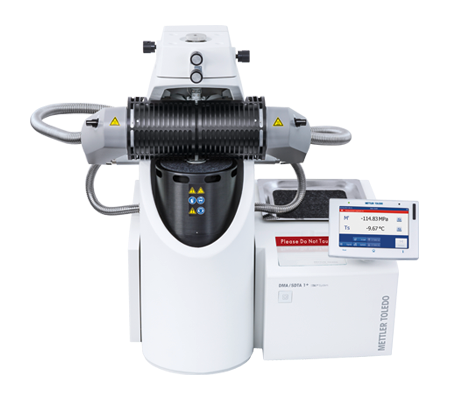Advance Analytical
เครื่องมือวิเคราะห์ทางวิทยาศาสตร์ขั้นสูง Advance Analytical
Advance Analytical
Hits: 3149
Dynamic mechanical analysis (DMA) is used to measure the mechanical and viscoelastic properties of a material as a function of temperature, time and frequency while it is subjected to an oscillating stress.

DMA is an important technique used to measure the mechanical and viscoelastic properties of materials such as thermoplastics, thermosets, elastomers, ceramics and metals.
In DMA, the sample is subjected to a periodic stress in one of several different modes of deformation (bending, tension, shear and compression).
Modulus as a function of time or temperature is measured and provides information on phase transitions.
DMA technology is the perfect solution when maximum accuracy is required and the material has to be characterized over a wide range of stiffness and/or frequency. In addition, DMA technology is extremely versatile and therefore, DMA can characterize materials even in liquids or at specific relative humidity levels.
The METTLER TOLEDO DMA/SDTA1+ sets new standards in the market. In comparison with conventional DMA instruments it offers new and unique performance benefits:
A frequency range up to 1000 Hz for material behavior simulation and accurate determination of moduli through the presence of a dedicated force sensor.
A frequency range up to 1000 Hz for material behavior simulation and accurate determination of moduli through the presence of a dedicated force sensor.
- Unique measurement of both displacement and force results in a very accurate determination of moduli
- Wide force range from 1 mN to 40 N allows you to measure very soft and very stiff samples
- Broad frequency range from 0.001 to 1000 Hz means you can perform measurements under real conditions or more rapidly at higher frequencies
Features and benefits of the METTLER TOLEDO DMA/SDTA 1+:
•Unique measurement of both displacement and force results in a very accurate determination of moduli
•Wide force range from 1 mN to 40 N allows you to measure very soft and very stiff samples
•Broad frequency range from 0.001 to 1000 Hz means you can perform measurements under real conditions or more rapidly at higher frequencies
•DMA Experiment Wizard sets up the perfect experiment for the best results
•Patented SDTA technique enables you to calibrate sample temperature and accurately measure thermal effects
•Extremely wide stiffness range means you can measure a sample from the glassy to the liquid state in one single run
•Ergonomic design and touch-screen control ensures faster setup and optimization of experiments
•Wide force range from 1 mN to 40 N allows you to measure very soft and very stiff samples
•Broad frequency range from 0.001 to 1000 Hz means you can perform measurements under real conditions or more rapidly at higher frequencies
•DMA Experiment Wizard sets up the perfect experiment for the best results
•Patented SDTA technique enables you to calibrate sample temperature and accurately measure thermal effects
•Extremely wide stiffness range means you can measure a sample from the glassy to the liquid state in one single run
•Ergonomic design and touch-screen control ensures faster setup and optimization of experiments
Contact us
Syntech Innovation Co., Ltd.
388/5 Nuanchan Road, Nuanchan,
Buengkum, Bangkok 10230
388/5 Nuanchan Road, Nuanchan,
Buengkum, Bangkok 10230
0 2363 8585 (auto)
0 2363 8595
081 498 9939

3089214
Today
Yesterday
This Month
All days
172
1549
28922
3089214
Your IP: 216.73.216.80
2026-02-17 02:26





